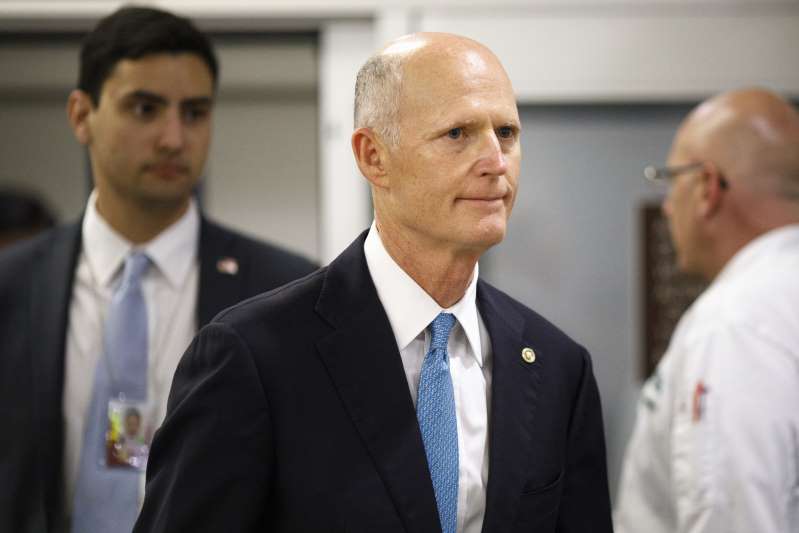By Daniel Moritz-Rabson, Newsweek–
Americans should receive tax cuts from money raised through tariffs on Chinese imports, Florida Senator Rick Scott said on Monday.
Scott, a Republican, repeatedly referred to China as an “adversary” while speaking with CNBC’s Squawk Box and even said that President Donald Trump should not back off his trade war if its impacts push the U.S. into a recession prior to the 2020 election.
“They’re our political adversary, economic adversary, military adversary. So we’ve got to do everything we can to take care of ourselves and see if we can get them to change. But right now I don’t see how we’ll get a deal done with them. We’ve got to help American companies to do everything we can to buy American products, so we get more American jobs and stop helping China and stop acting like they’re a partner,” Scott said.
“Clearly we’re going to have some short-term pain. But we’ve got to stop China from stealing our technology. They’ve got to open up their markets. They’ve got to start being a partner. They’re not a partner. So I think anything we raise in tariffs, we ought to give back to the rank and public in tax reductions so it doesn’t impact American families. We’ve got to help American farmers open up more markets around the world,” he continued.
Trump, who has nicknamed himself “Tariff Man,” has falsely claimed that China is footing the bill for the tariff war. Economic analyses have shown that the tariffs are imposing a hefty toll on American companies and consumers, who are forced to pay more for products imported from China.
Research published by the New York Fed estimated that the cost of the existing tariffs, which affect $250 billion in imported goods, is $831 per household. The total cost to consumers is $106.074 billion.
Although the Trump administration collected $63 billion in tariffs over a 12 month period which ended June 30, the U.S. raised approximately $30 billion in tariffs before the Trump administration took office. The Trump administration has also authorized $28 billion in bailouts to farmers who have been hard-hit by the trade war.
Scott’s statements echoed those of the Trump administration, which has depicted the negative economic impacts of the trade war with China as a temporary plan to force a lasting restructuring of the Beijing-Washington trade dynamic. Yet as the trade war drags on and threatens to escalate, with Trump raising the possibility of implementing tariffs on $300 billion more imports from China and primarily affect consumer goods, no end appears to be in sight.
China retaliated against the U.S. last week by letting its currency drop below a symbolic threshold and announcing it would stop all agricultural imports. Additionally, the U.S. appears unable to make progress on altering Chinese policy on technology, a core component of Trump’s grievances with Beijing.
The trade war is having a significant impact on global economic growth, creating uncertainty for businesses. Federal Reserve Chairman Jerome Powell cited trade policy uncertainty when announcing a rate cut last month. Small business confidence is down, according to a CNBC and SurveyMonkey poll released on Monday. And in a note sent to clients on Sunday, Goldman Sachs decreased its fourth quarter growth estimates from 2.0 percent to 1.8 percent.
A recession before the 2020 election would put a damper on Trump’s re-election bid. Throughout his 2016 presidential campaign and subsequent presidency, Trump has heavily promoted his economic policies, with more than half of Americans saying they approve of his handling of the economy.
Scott, however, promoted resolving trade grievances with China rather than altering policy prior to the election.
“I think you got to keep going down this path…we all have to understand they are our adversary,” he told Squawk Box. “If we believe in American values and we believe in free enterprise, then we’ve got to fight.”


Leave A Comment
You must be logged in to post a comment.